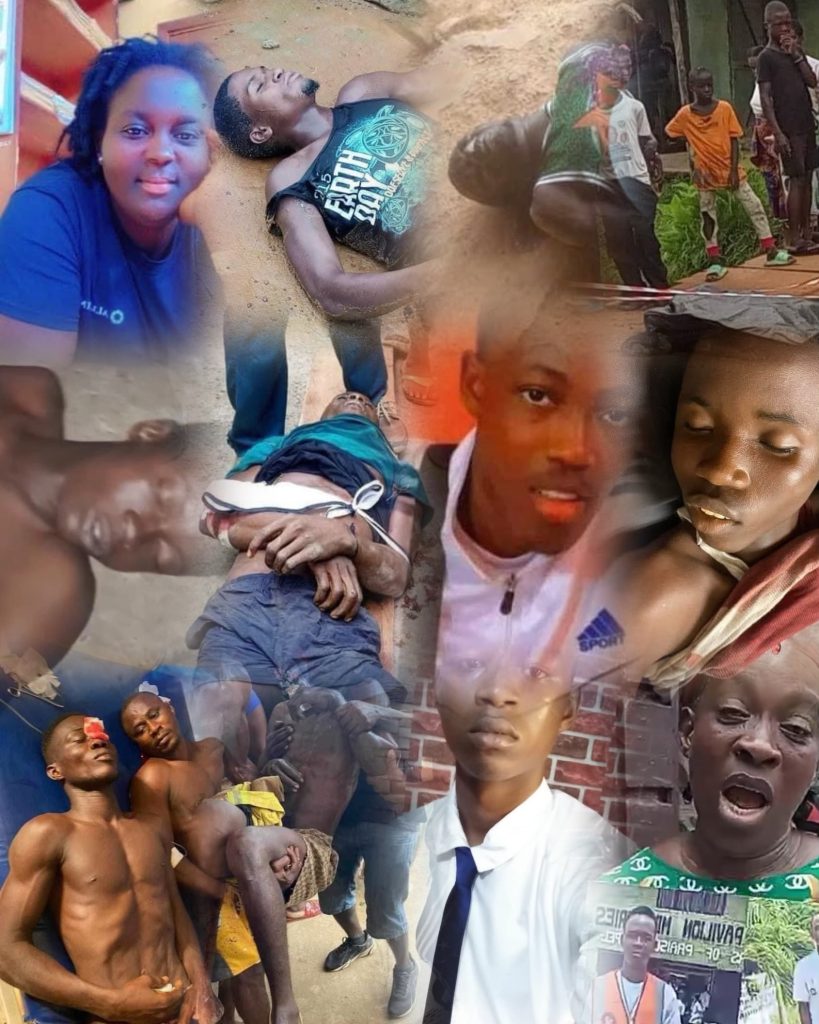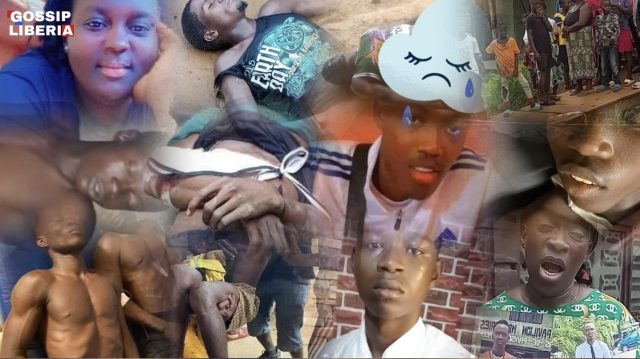A year marked by police brutality, mysterious murders, and state violence—report unveils the human cost of Liberia’s justice failures.
Monrovia, Liberia – Liberia is mourning the loss of over 23 innocent lives, tragically documented in a human rights report that has been studied throughout the year. From January 15 to October 16, 2024, civilians—many of them young, some victims of state violence, and others murdered under mysterious circumstances—have been killed, leaving families in grief and demanding justice.
A comprehensive report exposes a country in crisis, where law enforcement and government actions have often led to the deaths of the very citizens they are sworn to protect. The victims’ stories highlight a terrifying pattern of violence and impunity in Liberia.
Most Recent Incident: The Shooting of Dennis Smith
The most recent death occurred on October 12, 2024, when 22-year-old Dennis Smith was shot by an officer of the Liberia Drug Enforcement Agency (LDEA) at Old Matilda, Junior Randall Junction. Smith, described by family members as peaceful, was killed in what witnesses claim was an unprovoked use of force. The incident has reignited public outrage and protests demanding police reform and accountability.
A Widening Tragedy: Youth Lost to Violence
The same day, James Kany, a 17-year-old schoolboy from the Rehab community, was found dead. His death, still under investigation, has sent shockwaves through the community, where students, teachers, and parents fear for their children’s safety. Kany’s murder raises questions about the environment in which Liberia’s youth are growing up, amidst rising violence and insecurity.
Earlier this year, Rejoice Kesselly was murdered in the Soul Clinic Bus Parking on January 15, 2024. Kesselly’s death remains unsolved, adding to the growing list of victims whose cases have stalled within Liberia’s judicial system.
Former Officer Killed: Amanda Nebo’s Case
On April 14, 2024, Amanda Nebo, a former City Police officer, was found dead. Nebo’s murder has not only devastated her family but also sparked concerns about possible connections between her death and her previous work in law enforcement. Her family and colleagues are pushing for a deeper investigation, fearing her death could be linked to those seeking revenge or silencing her for past police activities.
Police Brutality and the Deadly Use of Force
The report details several incidents of police brutality that have shocked the nation. Bangalie Kamara and Essah Massaley were shot and killed by police officers on February 28, 2024, in what witnesses described as an unjustified response to a non-violent situation. No officers have yet been held accountable for the killings, further fueling public frustration with law enforcement’s lack of transparency and discipline.
Similarly, the shooting of Mohammed Manobah, a 19-year-old, on April 12, 2024, in the Banjor Gas Station community, has sparked outrage. Manobah was killed by police in an altercation that locals claim could have been de-escalated without lethal force. His death has become a flashpoint for demands to overhaul Liberia’s police conduct standards.
A Long List of Unsolved Cases
Pakalah’s report includes numerous unsolved murders, many involving young men whose deaths remain shrouded in mystery. Franklin Dargor was killed on March 12, 2024, and Austine Yarkpawolo met a similar fate on April 17, 2024. Both cases remain unresolved, with no suspects or leads.
The violent deaths of Morris Gomo and Roseline Borbor on July 2, 2024, have left their families in mourning, frustrated with the slow pace of investigations. Borbor’s killing was particularly shocking, as she had no known enemies or connections to criminal activities, making her death all the more perplexing.
Meanwhile, the murders of Dorothy Nyemah and Emmanuel Kollie on June 7, 2024, and Armaline Zubah on June 4, 2024, have yet to be solved, leaving a growing number of families seeking justice and answers.
A Dangerous Precedent: Power Theft Leads to Death
Perhaps one of the most alarming deaths this year was that of Joecephus S. Tukpeh, killed by a Liberia Electricity Corporation (LEC) anti-power theft team. Tukpeh’s death occurred during a raid intended to prevent illegal electricity connections, but it spiraled into violence, resulting in his fatal injury. This incident has raised questions about the LEC’s methods and the heavy-handed tactics often used in anti-theft operations.

An Urgent Call for Reform
Titus B. Pakalah’s report serves as a grim reminder of the failure of Liberia’s justice and law enforcement systems. Speaking to the media, Pakalah stated, “We are facing a human rights crisis. Our institutions are supposed to protect, not kill. Innocent Liberians, especially young people, are dying without any accountability. This cannot continue.”
Pakalah, alongside human rights organizations, is calling for immediate reforms, including the establishment of an independent commission to investigate these deaths, a revision of police rules of engagement, and stronger oversight of government agencies like the LDEA and the LEC.
Activists have joined forces to demand a clear and transparent inquiry into these incidents, and some are pushing for the involvement of international human rights organizations to pressure Liberia’s government to act swiftly and decisively.
A Nation Demands Justice
As Liberia approaches the close of 2024, the families of those who have lost their lives are growing impatient with the government’s slow response to the spate of killings. From Dennis Smith to Joecephus Tukpeh, their deaths paint a bleak picture of a country struggling to uphold human rights.
The calls for justice are growing louder, and Liberia’s government must decide whether it will heed these demands or continue to ignore the mounting death toll and the crisis unfolding in its communities.












